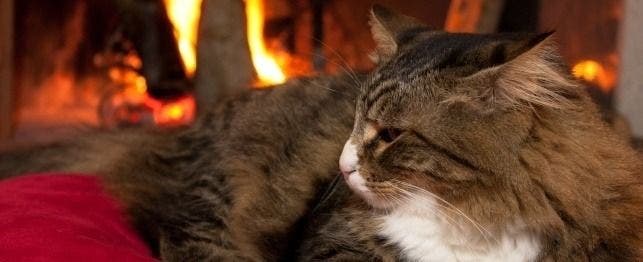
How House Fires Can Affect Your Cat
House Fires and Cats
House fires are usually devastating and horrible events. Not only are men, women and children affected, but so are our pets. Especially disturbing is the pet home alone during a fire with no way to call for help and no way to escape. Your pet cannot place wet towels under the door. He is trapped and completely at the mercy of neighbors or passersby. Hopefully, someone will notify the fire department so help can arrive.
During a fire, pets are susceptible to the same potentially fatal products as are people. The main culprits are carbon monoxide, smoke inhalation and burns.
Carbon Monoxide Toxicity in Cats
The rapid production and accumulation of carbon monoxide (CO) is a byproduct of a fire. Carbon monoxide is inhaled into the lungs where the molecules pass into the bloodstream and attach to hemoglobin. Hemoglobin normally binds to oxygen and carries it through the bloodstream; however, if carbon monoxide is available, the hemoglobin is more likely to bind to it. Signs of CO poisoning include lethargy, weakness and collapse. If removed from the environment and given supplemental oxygen, many pets will recover. There is no way to remove CO from the bloodstream; it must be metabolized.
Smoke Inhalation in Cats
How House Fires Can Affect Your Cat
Where there’s fire, there’s smoke. Although not the adage everyone is used to, it is still true. Smoke is one of the most lethal aspects of fires. Cats and dogs have small airways and lung capacity, and similar to babies, they are very sensitive to smoke. Animals don’t know to get down low. Many pace and become frantic when trapped in a fire. This increases their respiratory rate and increases the amount of smoke inhaled.
Inhaled smoke is extremely damaging to the lungs. Soot and ash are deposited within the lung tissue, making breathing difficult. Pets surviving the fire may still succumb to smoke inhalation injury days later. Removing the pet from the environment and offering supplemental oxygen is the best initial treatment. Affected animals are often hospitalized for several days. Chest X-rays and medications, along with oxygen, may be required. If they survive, some pets may have a lifetime of breathing problems due to the residual lung damage and scarring caused by the smoke.
Burns in Cats
Thermal burns are not that common but do occur. Pets rarely attempt to run through burning flames. By the time the flames reach them, most have succumbed to CO and smoke inhalation. Those that do have burns usually have them on their faces and paws. Singed whiskers, burned skin and paws are most likely. Depending on the extent of the injury, treatment may be long, extensive and expensive. Animals with burns associated with fires almost always have some degree of CO and smoke inhalation damage.
What to Do If You Have a House Fire
The best thing you can do is to keep your house free of potential fire hazards. Don’t overload wall sockets or circuits. Turn off electrical appliances when you are not home. Make sure your furnace is checked for malfunctions. Don’t keep combustible materials in the home.
Unfortunately, most fires occur in the wintertime. Christmas lights draped over a dried tree, space heaters in closed houses and warm welcoming fireplaces all can be sources of fires. Don’t leave a fire burning when you go to sleep or leave the house. Make sure the Christmas lights are unplugged and keep the tree watered. Turn off space heaters at night and when you leave the home.
Make sure your neighbors know you have pets in our home in case something happens when you are away. Apply a sticker to a front window or the front door to notify the fire department that there are pets inside.
If you are in your home when a fire occurs, or arrive to find your house burning, the first priority is to make sure all the people are out of the house. If you can easily remove your pet without any threat to your safety, take the pet with you as you leave. Do not enter a burning building. Call the fire department and wait for the trained and equipped firefighters to rescue any person or any pet left in the home.